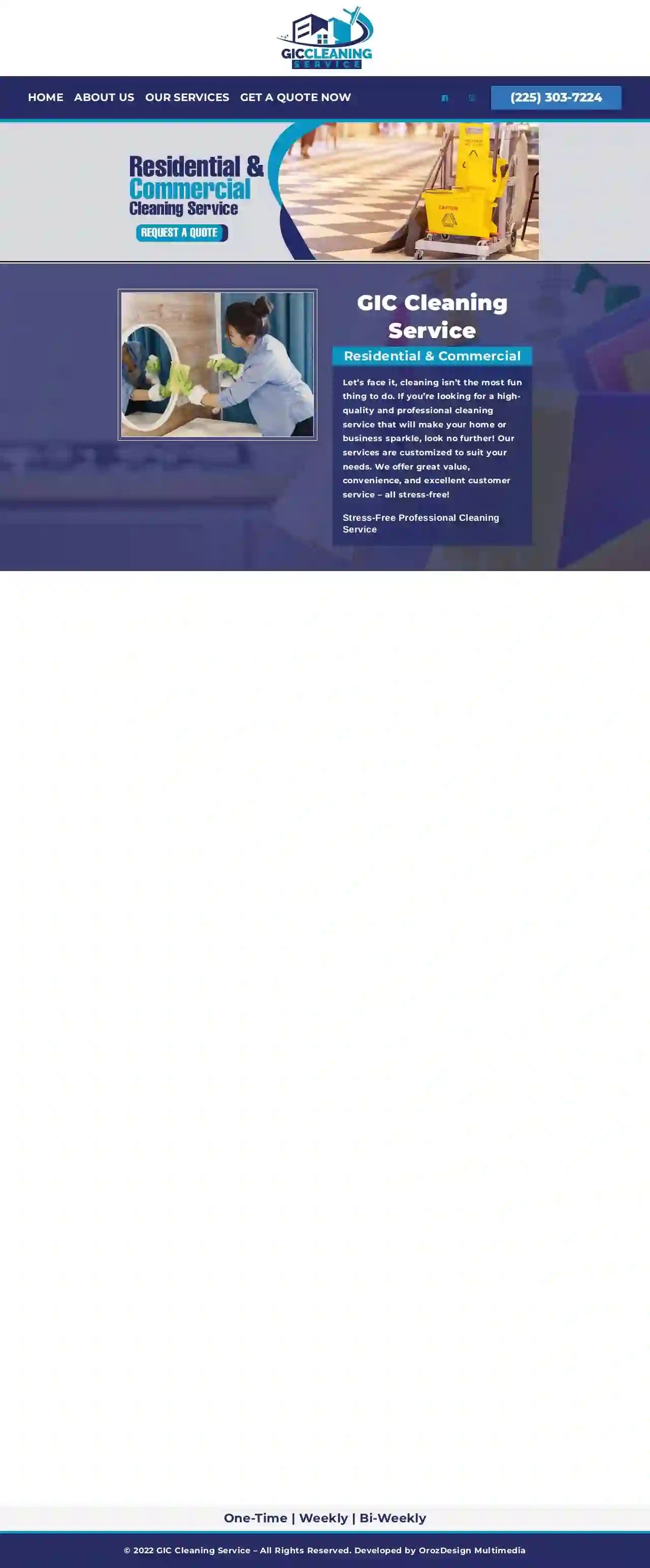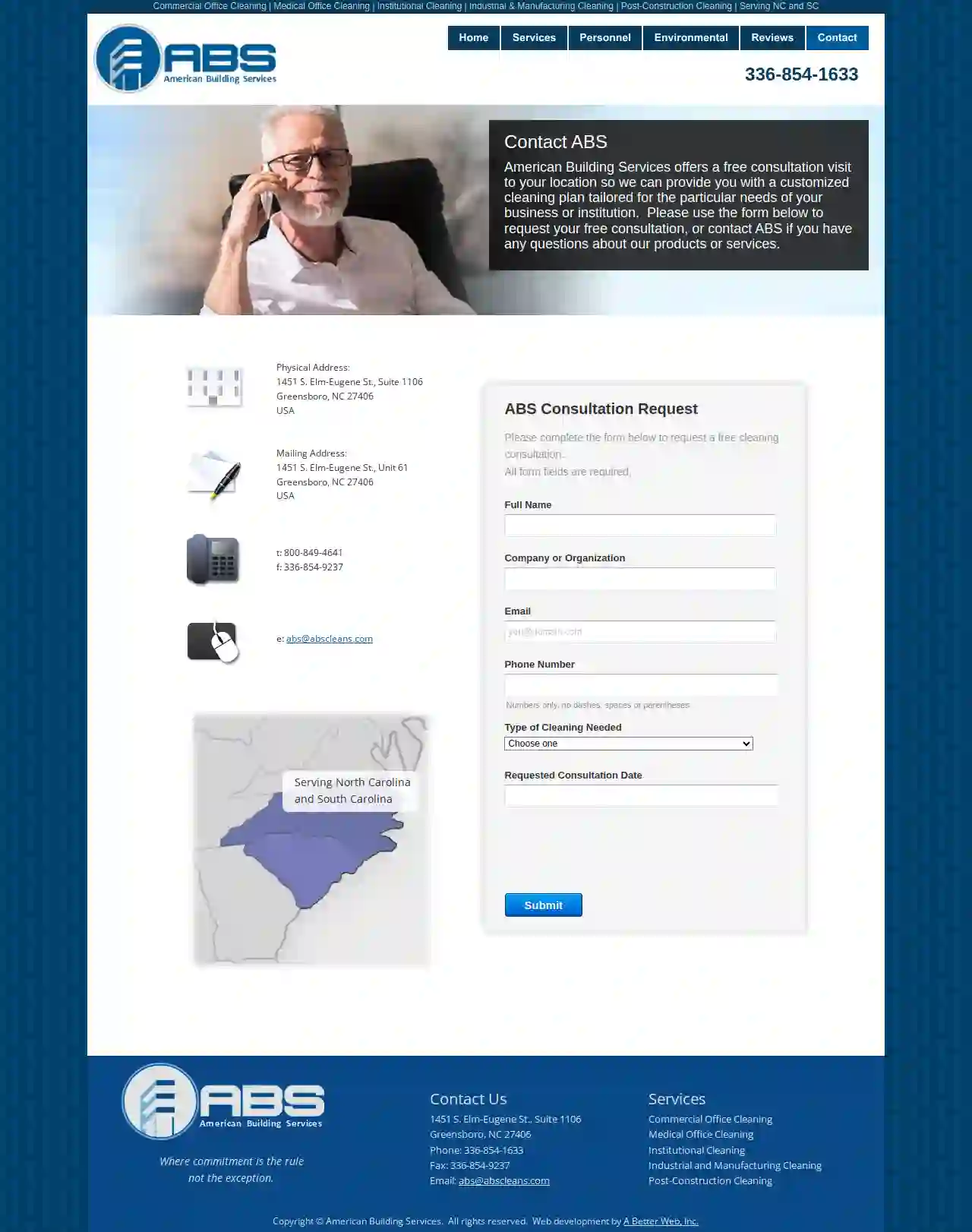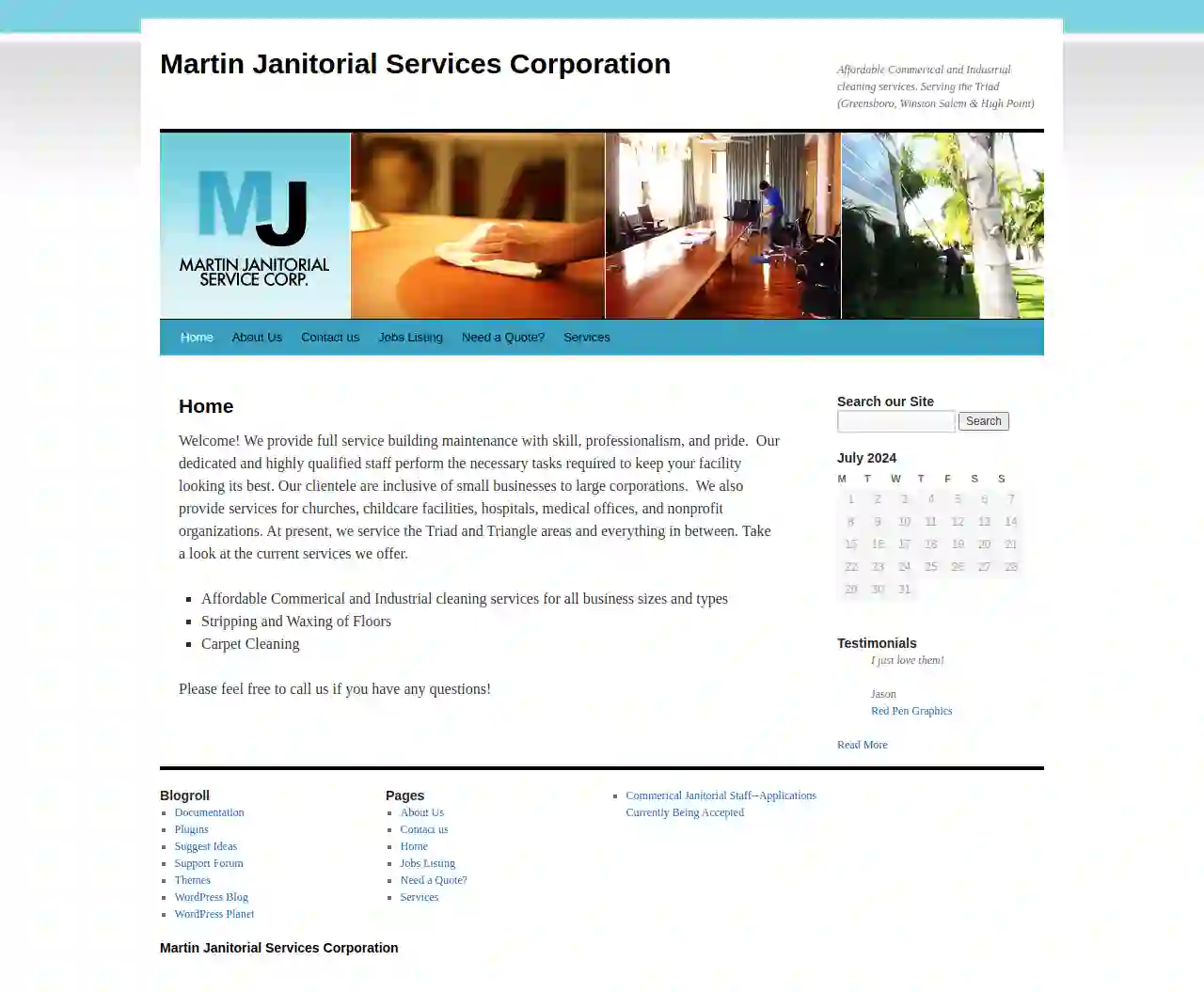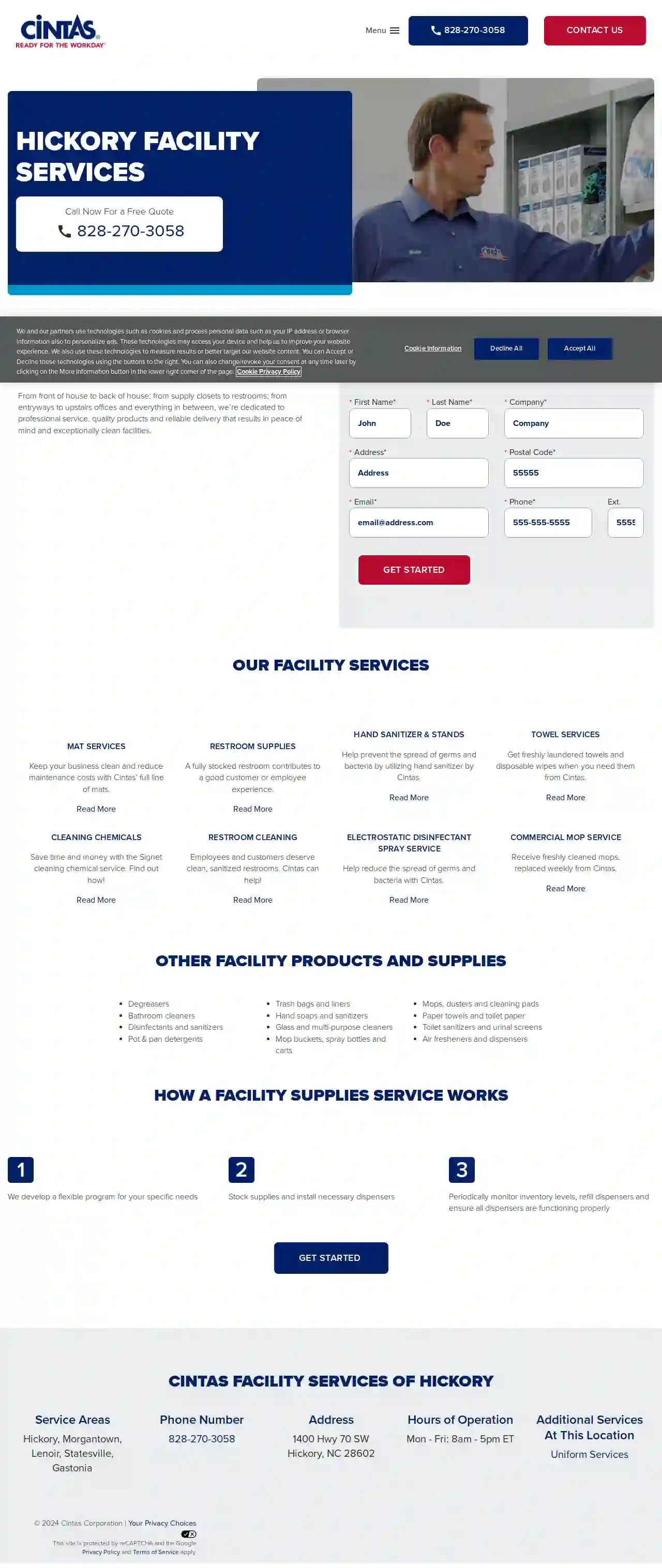Cleaning Services Gibsonville
Find top Professional Cleaners in Gibsonville
Get up to 3 House Cleaning quotes for your project today! Compare profiles, reviews, accreditations, portfolio, etc... and choose the best service.

GIC Cleaning Services
53 reviews123 Main St, Baton Rouge, 70809, USAt GIC Cleaning Service, we understand that cleaning isn't the most enjoyable task. That's why we offer high-quality, professional cleaning services tailored to your needs. Our goal is to provide the highest quality cleaning services in the area, ensuring your property looks its best. We're committed to delivering friendly, professional services that make your life easier. Whether you need one-time, weekly, or bi-weekly cleaning, we've got you covered. Our services include post-construction, commercial, spring, residential, move-in/move-out, basic, deep, and vacation rental cleaning. Request your quote now and let us take care of the dirt work for you!
- Services
- Why Us?
- Gallery
Get Quote
Dream & Clean
4.841 reviewsHigh Point, US- Services
- Why Us?
- Gallery
Get Quote
American Building Service
42 reviewsSuite 1106, 1451 S. Elm-Eugene St., Greensboro, 27406, USAt American Building Services, we offer a wide range of cleaning services tailored to meet the specific needs of our clients. With a commitment to providing cost-effective solutions, we establish trusting relationships built on personal service. Our team of experienced professionals is dedicated to ensuring the cleanliness and safety of your facility, whether it's a commercial office, medical facility, institution, or industrial and manufacturing site. We also provide post-construction cleaning services to ensure your newly built or renovated space is spotless and ready for occupancy.
- Services
- Why Us?
- Gallery
Get Quote
Martin Janitorial Services Corporation
4.17 reviewsGreensboro, USWelcome! We provide full service building maintenance with skill, professionalism, and pride. Our dedicated and highly qualified staff perform the necessary tasks required to keep your facility looking its best. Our clientele are inclusive of small businesses to large corporations. We also provide services for churches, childcare facilities, hospitals, medical offices, and nonprofit organizations. At present, we service the Triad and Triangle areas and everything in between. Take a look at the current services we offer. Affordable Commerical and Industrial cleaning services for all business sizes and types Stripping and Waxing of Floors Carpet Cleaning Please feel free to call us if you have any questions!
- Services
- Why Us?
- Testimonials
- Gallery
Get Quote
Merry Maids of Greensboro
4.249 reviewsGreensboro, US- Services
- Why Us?
- Gallery
Get Quote- Bl
Blue Print Cleaning Services, LLC
510 reviewsGastonia, US- Services
- Why Us?
Get Quote 
Maid In Jax
4.127 reviewsJacksonville, US- Services
- Why Us?
Get Quote
Cintas Facility Services
53 reviewsHickory, US- Services
- Why Us?
Get Quote
Dust and Mop House Cleaning of Apex
4.9128 reviewsRaleigh, US- Services
- Why Us?
Get Quote
Merry Maids of Asheville
4.684 reviewsAsheville, US- Services
- Why Us?
Get Quote
Over 60,241+ Cleaning Services registered
Our cleaning contractors operate in Gibsonville and surrounding areas!
CleaningMatch has curated and vetted the Best Janitorial Services arround Gibsonville. Find the most reliable pro today.
Frequently Asked Questions About Cleaning Services
- Blot, don't rub: When treating fresh stains, blot with a clean cloth or paper towel to absorb as much of the stain as possible. Rubbing can spread the stain and damage carpet fibers.
- Club Soda: For spills like wine or coffee, pour club soda on the stain, let it fizz, then blot with a clean cloth. Repeat if needed.
- Vinegar Solution: Mix equal parts white vinegar and water, apply to the stain, and blot. Vinegar helps remove stains and odors.
- Baking Soda Paste: Make a paste with baking soda and water, apply to the stain, let it dry, then vacuum. Baking soda absorbs odors and lifts stains.
- Commercial Carpet Cleaner: : Use a commercial carpet cleaner according to the instructions. Choose a cleaner specifically designed for the type of stain you're dealing with.
- Professional Carpet Cleaning: For stubborn or deeply set stains, consider hiring a professional carpet cleaning service. They have specialized equipment and expertise in stain removal.
- Declutter first: Before cleaning, declutter surfaces and remove any items that don't belong. This makes cleaning easier and prevents distractions.
- Gather your supplies: Assemble all your cleaning supplies, including cleaners, cloths, sponges, and a trash bag, in a caddy or bucket to avoid wasting time searching for them.
- Work from top to bottom: Start cleaning from the top of each room and work your way down to prevent dust and debris from falling on already cleaned surfaces.
- Focus on high-traffic areas: Pay extra attention to high-traffic areas like kitchens and bathrooms, where dirt and germs accumulate quickly.
- Use the right tools: Utilize appropriate cleaning tools for different surfaces and tasks. Microfiber cloths are effective for dusting and cleaning glass, while scrub brushes are ideal for tough stains.
- Clean in sections: Break down larger tasks into smaller sections to avoid feeling overwhelmed. Focus on one area at a time before moving on to the next.
- Establish a routine: Create a regular cleaning schedule and stick to it. This prevents dirt buildup and makes cleaning more manageable.
- Weekly: Suitable for busy households with children or pets, ensuring a consistently clean and healthy environment.
- Bi-weekly: A good option for smaller households or those who maintain a relatively clean home.
- Monthly: May be sufficient for individuals or couples who live a minimalist lifestyle.
- Quarterly or Annually: Can be suitable for deep cleaning or seasonal cleaning tasks.
Do I need to provide cleaning supplies for the cleaning service?
If you have specific preferences for cleaning products, such as eco-friendly or hypoallergenic options, communicate those to the cleaning service. They may accommodate your requests or allow you to provide your preferred supplies.
How can I get rid of tough stains on carpets?
Always test any cleaning solution on a small, inconspicuous area of the carpet first to ensure it doesn't cause discoloration or damage.
What are some tips for cleaning my own home efficiently?
By implementing these strategies, you can clean your home more efficiently and maintain a cleaner and healthier living space.
How often should I have my house cleaned?
You can adjust the frequency based on your needs and budget. Some people opt for weekly cleaning for high-traffic areas like kitchens and bathrooms and bi-weekly cleaning for the rest of the house.
Do I need to provide cleaning supplies for the cleaning service?
If you have specific preferences for cleaning products, such as eco-friendly or hypoallergenic options, communicate those to the cleaning service. They may accommodate your requests or allow you to provide your preferred supplies.
How can I get rid of tough stains on carpets?
- Blot, don't rub: When treating fresh stains, blot with a clean cloth or paper towel to absorb as much of the stain as possible. Rubbing can spread the stain and damage carpet fibers.
- Club Soda: For spills like wine or coffee, pour club soda on the stain, let it fizz, then blot with a clean cloth. Repeat if needed.
- Vinegar Solution: Mix equal parts white vinegar and water, apply to the stain, and blot. Vinegar helps remove stains and odors.
- Baking Soda Paste: Make a paste with baking soda and water, apply to the stain, let it dry, then vacuum. Baking soda absorbs odors and lifts stains.
- Commercial Carpet Cleaner: : Use a commercial carpet cleaner according to the instructions. Choose a cleaner specifically designed for the type of stain you're dealing with.
- Professional Carpet Cleaning: For stubborn or deeply set stains, consider hiring a professional carpet cleaning service. They have specialized equipment and expertise in stain removal.
Always test any cleaning solution on a small, inconspicuous area of the carpet first to ensure it doesn't cause discoloration or damage.
What are some tips for cleaning my own home efficiently?
- Declutter first: Before cleaning, declutter surfaces and remove any items that don't belong. This makes cleaning easier and prevents distractions.
- Gather your supplies: Assemble all your cleaning supplies, including cleaners, cloths, sponges, and a trash bag, in a caddy or bucket to avoid wasting time searching for them.
- Work from top to bottom: Start cleaning from the top of each room and work your way down to prevent dust and debris from falling on already cleaned surfaces.
- Focus on high-traffic areas: Pay extra attention to high-traffic areas like kitchens and bathrooms, where dirt and germs accumulate quickly.
- Use the right tools: Utilize appropriate cleaning tools for different surfaces and tasks. Microfiber cloths are effective for dusting and cleaning glass, while scrub brushes are ideal for tough stains.
- Clean in sections: Break down larger tasks into smaller sections to avoid feeling overwhelmed. Focus on one area at a time before moving on to the next.
- Establish a routine: Create a regular cleaning schedule and stick to it. This prevents dirt buildup and makes cleaning more manageable.
By implementing these strategies, you can clean your home more efficiently and maintain a cleaner and healthier living space.
How often should I have my house cleaned?
- Weekly: Suitable for busy households with children or pets, ensuring a consistently clean and healthy environment.
- Bi-weekly: A good option for smaller households or those who maintain a relatively clean home.
- Monthly: May be sufficient for individuals or couples who live a minimalist lifestyle.
- Quarterly or Annually: Can be suitable for deep cleaning or seasonal cleaning tasks.
You can adjust the frequency based on your needs and budget. Some people opt for weekly cleaning for high-traffic areas like kitchens and bathrooms and bi-weekly cleaning for the rest of the house.